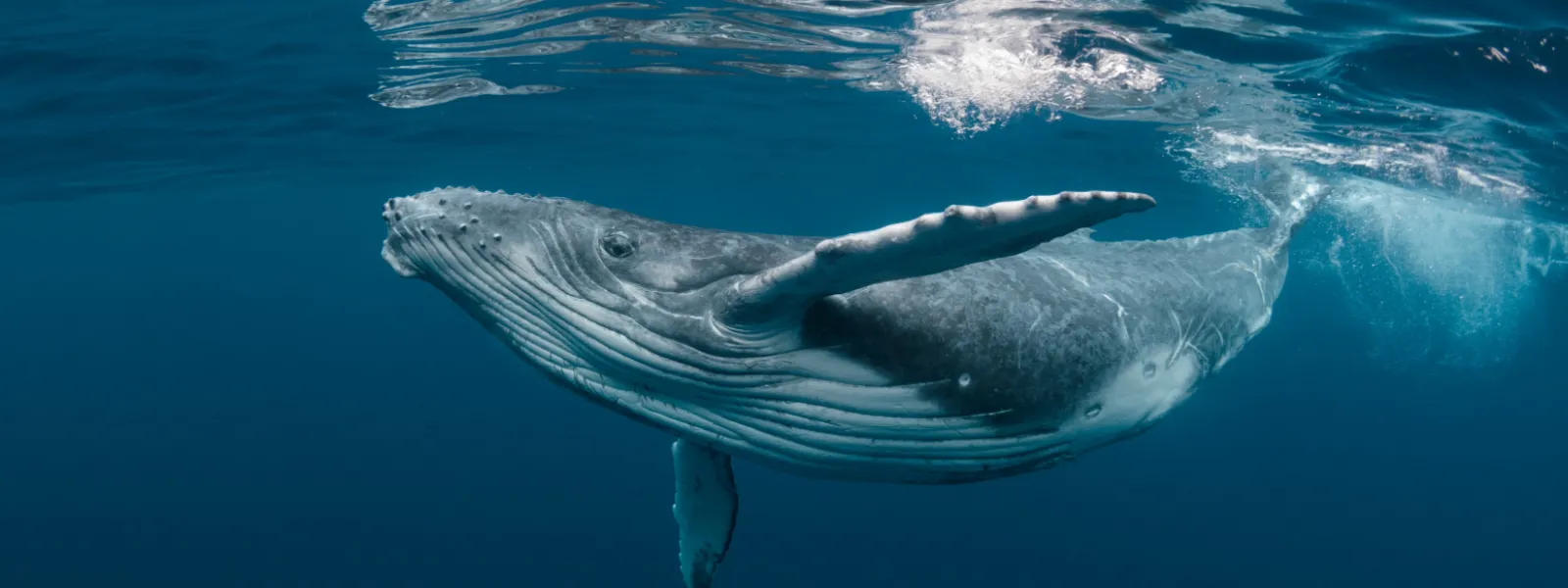
Whales and salmon farming: how does the industry impact our gentle marine giants?
Photo: Craig Lambert Photography on Shutterstock.Chile is by nature a country of marine mammals. Of the 94 species of cetaceans existing in the world, 43 have their habitat in the country's waters. And just over a quarter of them are found in Patagonia. But Chile is also a country of salmon, occupying the second place in the world production, surpassed only by Norway. The overlap of the salmon industry with the habitat of these emblematic marine mammals represents a significant threat to cetaceans in Chile about which not enough is known.
The recent deaths of three whales in protected areas of Chile's southern seas force us to ask ourselves why they are dying and how they are affected by the growing industry with which they share their habitat.
Civil society is responding. In early November 2024, Greenpeace - together with the Kawésqar community Grupos Familiares Nómadas del Mar and with the support of AIDA - filed two criminal complaints against those responsible for the deaths of humpback whales in protected areas.
These lawsuits, which have already been declared admissible, represent an unprecedented milestone in the country's criminal history, as they are the first take advantage of the amendaments made to the Penal Code by Law 21,595 on Economic and Environmental Crimes to the Penal Code to file a lawsuit for possible violations committed inside protected areas.
In this context, AIDA, together with Greenpeace and the NGO FIMA - historical allies in the resistance to the expansion of salmon farming in the waters of Chilean Patagonia - commissioned a scientific report entitle “Cetaceans and Salmon Farming: Challenges for the Protection of Marine Biodiversity in Chilean Patagonia.”
The report is currently available in Spanish, which lays out the available information on the impacts of salmon farming on the whales and dolphins of Chilean Patagonia. The results are alarming: serious risks have been identified, in addition to a lack of data that makes it difficult to understand the magnitude and consequences of the threats.
One of the most evident impacts is the incidental capture of small and large cetaceans in farming centers. There are documented cases of entanglement and deaths, although the lack of official records makes it difficult to measure the severity of the problem.
Another significant threat is the Intense maritime traffic in Patagonia, largely related to the salmon industry. Although there is no official data in Chile, there is evidence of deaths and serious injuries due to collisions between boats and whales. In addition, underwater noise from boat engines affects the health and well-being of the whales and dolphins, which depend on sound for communication and orientation.
In addition to these, there are other problems of the industry, whose effects on whales and dolphins have not been adequately studied, but which we should consider while the studies are being conducted. One of these is the escape of salmonids, which compete with native species for food resources and may carry diseases that could affect smaller cetaceans in particular by reducing the availability of prey that serve as food.
Microplastic pollution, 40 percent of which comes from salmon farming centers, is another under-researched environmental concern in terms of its impact on cetaceans. And the excessive use of antibiotics in Chilean salmon farming, one of the highest rates in the world, could be having negative indirect effects on the ecosystems that support these marine mammals.
Finally, one of the most significant environmental impacts of the salmon farming in Chilean Patagonia is the generation of hypoxia and anoxia due to the excess of organic matter in the farming centers, coming from salmon feces and uneaten food that falls to the seabed. The decomposition of this matter consumes the oxygen in the water, creating zones in the sea where life becomes difficult or impossible.
We hope that this report will fill the information gap that has become uncomfortable and even untenable in light of recent whale deaths.
With this evidence, even in a scenario of limited knowledge, we will be able to encourage a governmental response towards the rapid implementation of effective protection measures for whales and dolphins in Chilean waters.
Chile is a country of cetaceans, and as their guardians, we must ensure that our waters are a safe space for their development and well-being.
Read and download the report (in Spanish)
Florencia Ortúzar Greene

Florencia is the Director of AIDA's Climate Program, and Coordinator of the Climate Finance Area, working from Santiago, Chile. She obtained her Law degree from the Pontificia Universidad Católica de Chile and also completed an MSc in Environmental Politics and Regulation at the London School of Economics (LSE) in England. She joined our team in 2012 and collaborates with Climate and Ecosystem programs. She enjoys spending time with her pets as well as cooking, camping and nature trekking.
